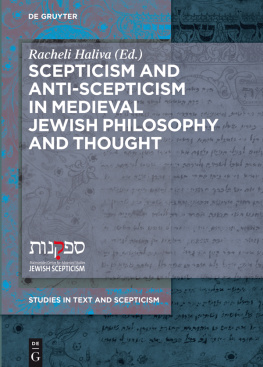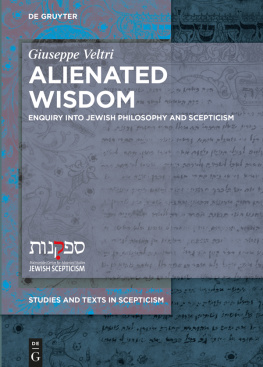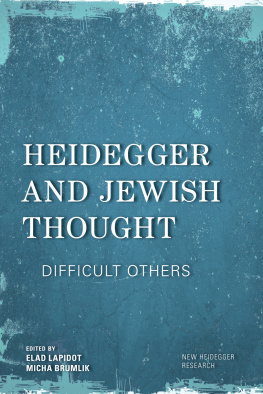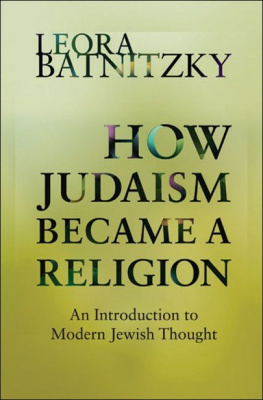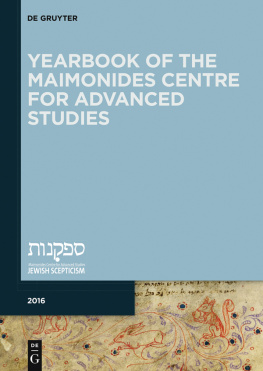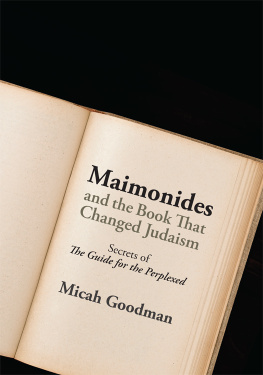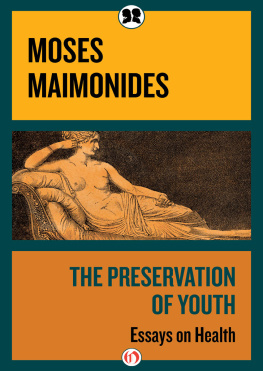Contents
Guide

Scepticism and Anti-Scepticism in Medieval Jewish Philosophy and Thought
Studies and Texts in Scepticism

Edited on behalf of
the Maimonides Centre for Advanced Studies
by Giuseppe Veltri
in Cooperation with Rachel Aumiller
Editorial Board
Heidrun Eichner, Talya Fishman, Racheli Haliva,
Henrik Lagerlund, Reimund Leicht, Stephan Schmid,
Carsten Wilke, Irene Zwiep
Volume 5
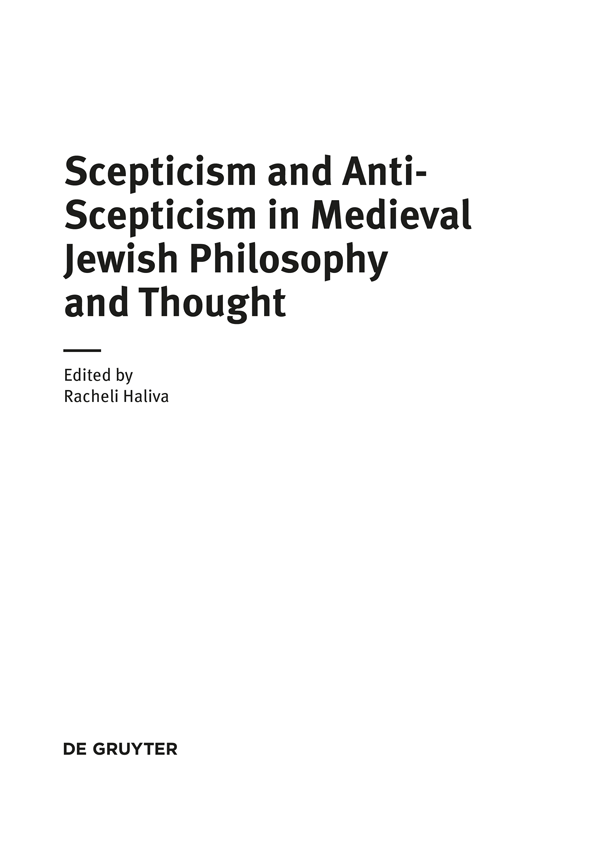
The series Studies and Texts in Scepticism is published on behalf of the Maimonides Centre for Advanced Studies

ISBN 978-3-11-055168-6
e-ISBN (PDF) 978-3-11-055332-1
e-ISBN (EPUB) 978-3-11-055291-1
ISSN 2568-9614

This work is licensed under the Creative Commons Attribution-NonCommercial NoDerivatives 4.0 License. For details go to http://creativecommons.org/licens-es/by-nc-nd/4.0/.
Library of Congress Control Number: 2018947831
Bibliographic information published by the Deutsche Nationalbibliothek
The Deutsche Nationalbibliothek lists this publication in the Deutsche Nationalbibliografie; detailed bibliographic data are available in the Internet at http://dnb.dnb.de.
2018 Racheli Haliva, published by Walter de Gruyter GmbH, Berlin/Boston
The book is published with open access at www.degruyter.com.
Cover image: Staats- und Universittsbibliothek Hamburg, Ms Cod. Levy 115, fol. 158r: Maimonides, More Nevukhim, Beginn von Teil III
www.degruyter.com

To Aba and Ima
Eliyahu and Simi Haliva
whose wisdom, generosity, love, and kindness have always inspired me
Introduction
When I arrived in Hamburg in December 2015, I was asked by the director of the Maimonides Centre for Advanced Studies Jewish Scepticism (MCAS-JS), Prof. Giuseppe Veltri, to actualize one of MCAS-JS projects a program that would allow scholars from MCAS-JS and from other universities to focus on scepticism and anti-scepticism in the Middle Ages. The reason behind this request, so I learned a few weeks later, was to explore the phenomenon of scepticism and/or anti-scepticism in Medieval Jewish thought, a phenomenon which is somewhat neglected in the history of scepticism. This is not to say that Jewish thinkers in the Middle Ages failed to write on the topic, but rather that in modern scholarship we rarely find systematic research, similar to that which we find in antiquity, that poses arguments for and against scepticism.
In order to advance this discussion, I contacted several scholars who, to my great surprise, immediately accepted the invitation to come to Hamburg and re-think several aspects of their research within a sceptical and/or anti-sceptical framework. This was not an easy task. Among the common questions were: what exactly do we mean by scepticism? Is it a philosophical concept discussed in the Academy or in the Pyrrhonian school? Is it connected also to the term safeq , doubt, which is usually applied to halakhic issues? I must confess that I did not have a clear response to these sorts of questions. Therefore, instead of providing a narrow definition of what scepticism is within Jewish thought, I asked the participants to clarify what the term means in their field of study.
MCAS-JS aims to advance research, mainly focusing on Jewish scepticism and anti-scepticism in relation to several contexts, in particular, but not exclusively, to general philosophy, halakhic, midrashic, and Kabbalistic contexts. The current volume is the outcome of a lecture series held at MCAS-JS from November 2016 until February 2017.
In order to give the reader a general view of the content of the articles presented in the book, I shall briefly summarise each contribution:
Howard Kreisel of Ben Gurion University examines the relationship between philosophic optimism and fideistic scepticism. In his article, Kreisel shows that the philosophical tradition that penetrated Jewish thought was essentially an optimistic one grounded primarily in the Arabic translations of the writings of Plato, Aristotle and the Neoplatonic philosophy of Plotinus. The Jewish thinkers, following in the footsteps of the Islamic ones, essentially believed that the intellect was capable of apprehending the most fundamental truths regarding God and the structure of the world, whether these truths are attained by way of logical syllogism in the tradition of Aristotle or by way of the illumination of the intellect in the tradition of Plotinus. This optimism can already be detected among the Islamic theologians ( Kalm ) and it influenced Saadiah Gaon. Philosophic optimism also characterises the Islamic philosophers, beginning with Al-Kindi, and in the Jewish world, beginning with Isaac Israeli, Saadiahs older contemporary. Subsequently, the Jewish philosophical tradition in Andalusia, particularly the philosophy of Solomon Ibn Gabirol, gives expression to this optimism. In later periods, philosophic optimism characterises the Jewish philosophers of Provence (thirteenth and early fourteenth centuries), whose most important exponent was Gersonides, as well as most of the Jewish philosophers of Spain up to the expulsion in 1492.
The most distinct example of philosophical scepticism in medieval Jewish philosophy can be found in the thought of Judah Halevi, whose thought may have been inspired by Al-Ghazl. Yet in his case, as in the case of Al-Ghazl, scepticism was invoked in order to defend religious doctrines and the truths of revelation (what some scholars have termed fideistic scepticism). In later periods, the use of scepticism was often still tied to the defence of religion, and explicitly did not question all forms of knowledge, most notably knowledge attained through revelation. Kreisel concludes with the problem of how to interpret Maimonides on this issue. Maimonides approach to the ability of philosophy to discover fundamental truths, while at times stressing its severe limitations in the area of metaphysics and even natural philosophy, has led to widely divergent interpretations of his thought. Maimonides was a qualified optimist in his philosophical approach, and some of his more radical sceptical statements regarding the limitations of philosophical knowledge may have served a religious purpose.
Ariel Malachi of Bar-Ilan University dives deeper into scepticism of the twelfth century. His article focuses on scepticism in Judah Halevis thought, in particular Halevis logical and epistemological aspects. According to Malachi, many scholars have acknowledged the importance of Judah Halevis criticism of philosophy. Some of them even pointed to Halevis use of philosophical tools to establish his criticism, in a way that might be regarded as a sceptical approach to philosophy. Nevertheless, the general impression from scholarly studies is that the criticism of philosophy is merely a secondary goal for the main goal of the Kuzari , namely proposing revelation as an alternative to philosophy, and accepting revelation in a very unsceptical manner. Perhaps that is the reason those scholars did not tend to analyse Halevis criticism of philosophy systematically. Malachi seeks to identify the principles of Halevis criticism of philosophy and argues that the criticism of philosophy represents a sceptical approach based on logical and epistemological principles of Aristotelian logic. He further argues that this sceptical approach is used not only to criticise philosophy, but also to establish revelation as a valid source of knowledge. Malachi concludes that for Halevi, revelation can be a legitimate possibility within the philosophical domain, but that in his sceptical approach, revelation is superior to other philosophical possibilities.

